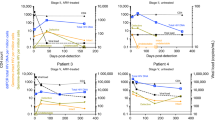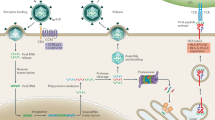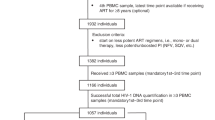Abstract
Given the variation in the HIV-1 viral load (VL) set point across subjects, as opposed to a fairly stable VL over time within an infected individual, it is important to identify the characteristics of the host and virus that affect VL set point. Although recently infected individuals with multiple phylogenetically linked HIV-1 founder variants represent a minority of HIV-1 infections, we found—in two different cohorts—that more diverse HIV-1 populations in early infection were associated with significantly higher VL 1 year after HIV-1 diagnosis.
This is a preview of subscription content, access via your institution
Access options
Subscribe to this journal
Receive 12 print issues and online access
$209.00 per year
only $17.42 per issue
Buy this article
- Purchase on Springer Link
- Instant access to full article PDF
Prices may be subject to local taxes which are calculated during checkout


Similar content being viewed by others
References
Keele, B.F. et al. Proc. Natl. Acad. Sci. USA 105, 7552–7557 (2008).
Abrahams, M.R. et al. J. Virol. 83, 3556–3567 (2009).
Li, H. et al. PLoS Pathog. 6, e1000890 (2010).
Sagar, M. et al. J. Virol. 77, 12921–12926 (2003).
Gottlieb, G.S. et al. Lancet 363, 619–622 (2004).
Jost, S. et al. HIV super-infection: rapid replacement of AE subtype by B subtype. Poster presented at the 9th Conference on Retroviruses and Opportunistic Infections, Abstract no.: 757-W (Seattle, Washington, 2002).
Altfeld, M. et al. Nature 420, 434–439 (2002).
Buchbinder, S.P. et al. Lancet 372, 1881–1893 (2008).
Rerks-Ngarm, S. et al. N. Engl. J. Med. 361, 2209–2220 (2009).
Rolland, M. et al. Nat. Med. 17, 366–371 (2011).
Rolland, M. et al. Nature 490, 417–420 (2012).
Janes, H. et al. PLoS ONE 7, e43396 (2012).
Rerks-Ngarm, S. et al. J. Infect. Dis. 207, 1195–1205 (2013).
Edlefsen, P.T., Gilbert, P.B. & Rolland, M. Curr. Opin. HIV AIDS 8, 432–436 (2013).
Rieder, P. et al. Clin. Infect. Dis. 53, 1271–1279 (2011).
Rodriguez, B. et al. J. Am. Med. Assoc. 296, 1498–1506 (2006).
Hodcroft, E. et al. PLoS Pathog. 10, e1004112 (2014).
Alizon, S. et al. PLoS Pathog. 6, e1001123 (2010).
Mellors, J.W. et al. Ann. Intern. Med. 126, 946–954 (1997).
Lingappa, J.R. et al. PLoS ONE 5, e12598 (2010).
Pond, S.L., Frost, S.D. & Muse, S.V. Bioinformatics 21, 676–679 (2005).
Prentice, H.A. et al. Immunogenetics 66, 299–310 (2014).
Acknowledgements
We would like to thank the participants in the Step study and the RV144 trial for their contributions to this research and Lisa Reilly for editorial help. Sequencing and analysis were performed under grants from the National Institute of Allergy and Infectious Diseases: US Public Health Service grant AI41505; Interagency Agreement Y1-AI-2642-12 with the US Army Medical Research and Material Command; US National Institutes of Health (NIH) grant 2R37AI05465-10 to P.B.G. This work was also supported by a cooperative agreement (W81XWH-07-2-0067) between the Henry M. Jackson Foundation for the Advancement of Military Medicine, Inc., and the US Department of Defense. The opinions expressed herein are those of the authors and should not be construed as official or representing the views of the US Department of Defense or the Department of the Army. This does not alter our adherence to policies on sharing data and materials.
Author information
Authors and Affiliations
Contributions
H.J. and M.R. designed and performed experiments, analyzed data and wrote the manuscript. S.T., A.D., J.T.H., L.C., S.G.S., S.P.B., M.J.M., R.J.O'C., R.M.P., S.R.-N., S.N., P.P., J.K., M.L.R., N.L.M., J.H.K. and P.B.G. oversaw the vaccine trials and clinical aspects. J.T.H., R.T., N.F., M.J.M., M.L.R., N.L.M., J.I.M., J.H.K. and P.B.G. edited the manuscript.
Corresponding author
Ethics declarations
Competing interests
M.R., S.T., R.T. and M.L.R. are employees of the Henry M. Jackson Foundation for the Advancement of Military Medicine, Inc.
Supplementary information
Supplementary Text and Figures
Supplementary Note and Supplementary Figure 1 (PDF 1044 kb)
Supplementary Tables
Supplementary Tables 1–3 (XLSX 66 kb)
Rights and permissions
About this article
Cite this article
Janes, H., Herbeck, J., Tovanabutra, S. et al. HIV-1 infections with multiple founders are associated with higher viral loads than infections with single founders. Nat Med 21, 1139–1141 (2015). https://doi.org/10.1038/nm.3932
Received:
Accepted:
Published:
Issue Date:
DOI: https://doi.org/10.1038/nm.3932
This article is cited by
-
Mycobacterium tuberculosis co-infection is associated with increased surrogate marker of the HIV reservoir
AIDS Research and Therapy (2020)
-
Impact of pre-adapted HIV transmission
Nature Medicine (2016)



